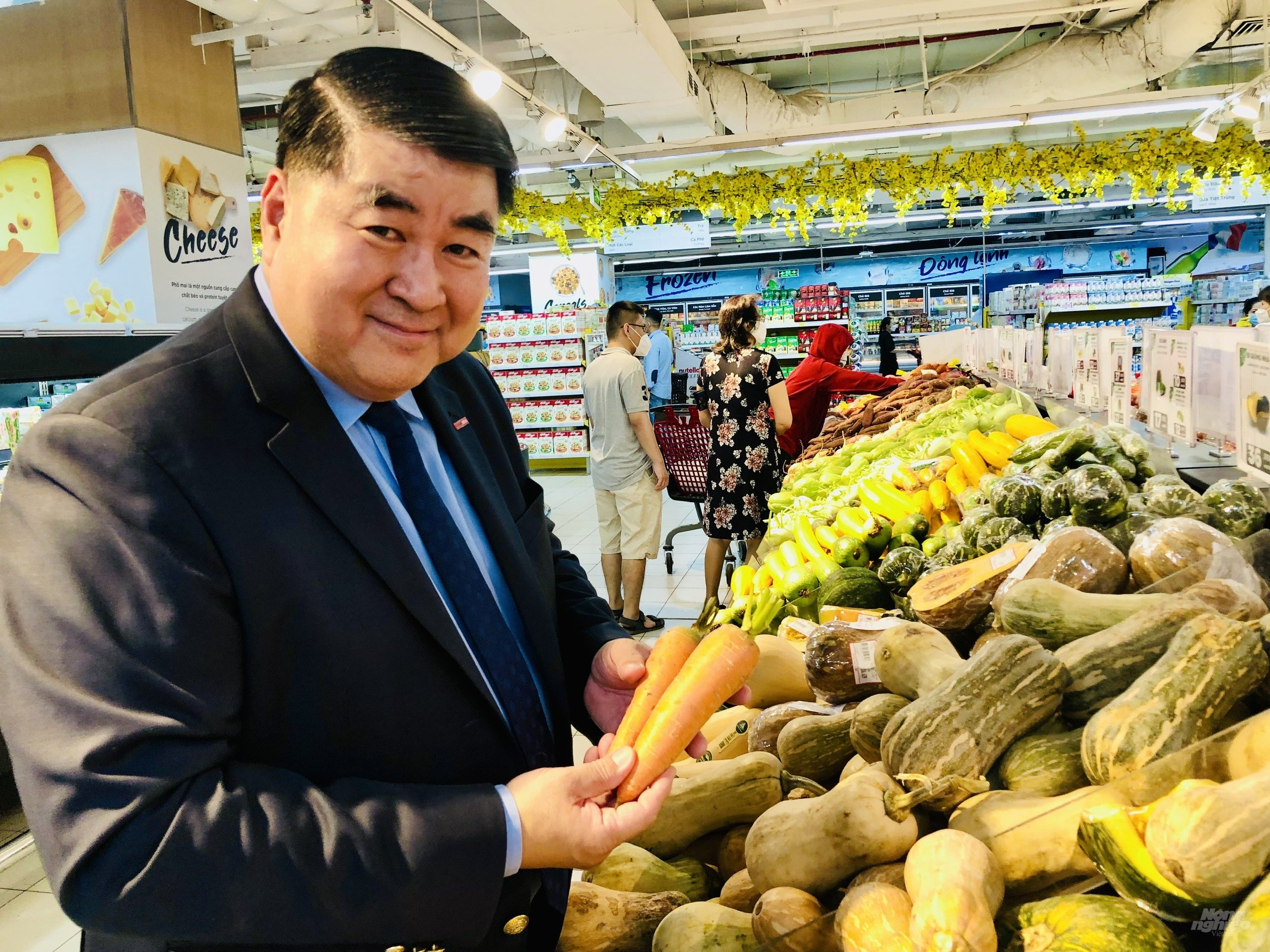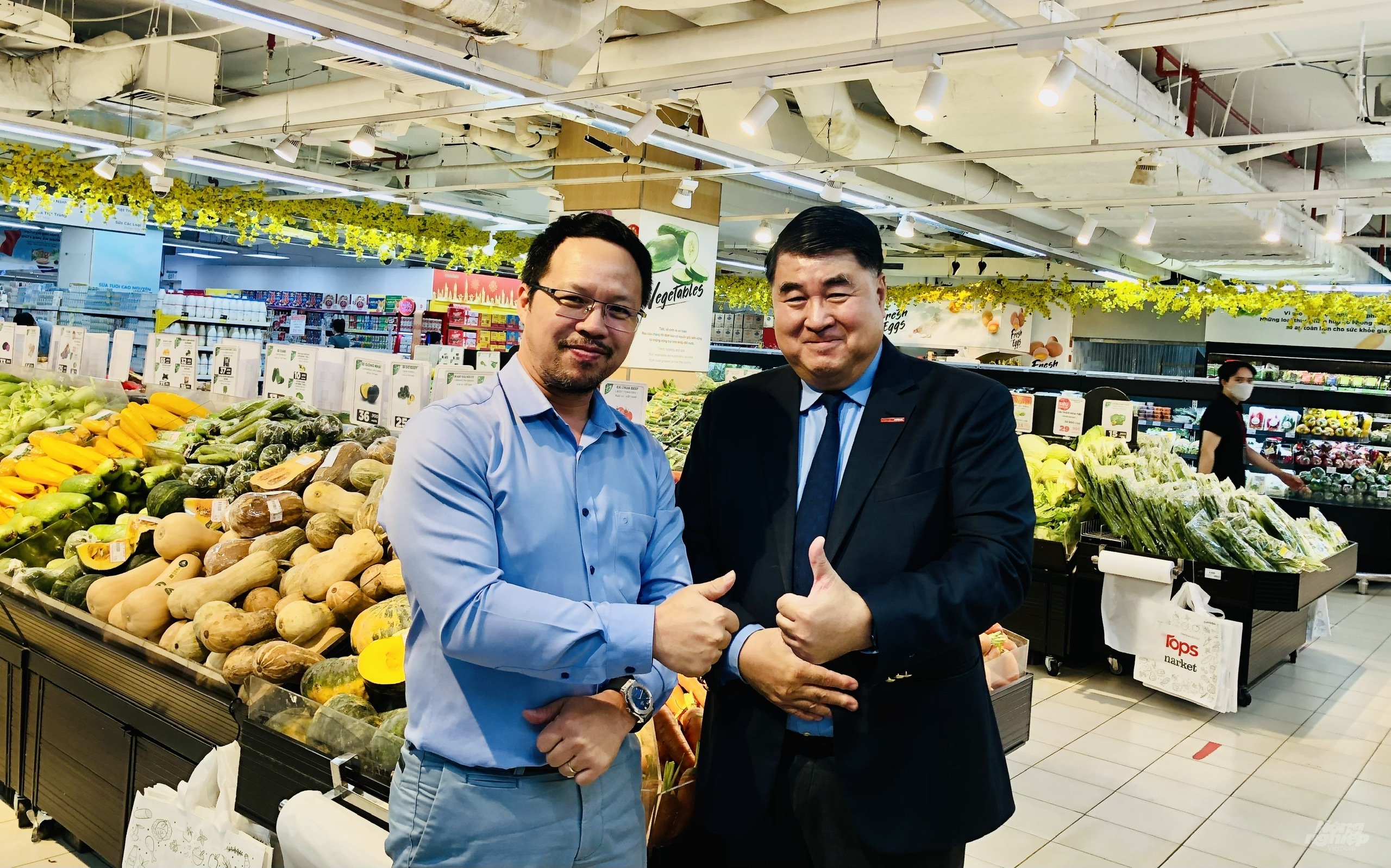June 17, 2025 | 20:47 GMT +7
June 17, 2025 | 20:47 GMT +7
Hotline: 0913.378.918
June 17, 2025 | 20:47 GMT +7
Hotline: 0913.378.918
I was born in Vietnam but have spent a major of time in Europe. I am currently the Vice President of Thailand's Central Retail Group, specializing in the retail system industry. I was previously a sales manager for a top European packaging firm, and feel that Vietnam's agriculture's future will undoubtedly expand.

Mr. Paul Le, Vice President of Central Retail Group, shared his business story about the retail system when he returned to Vietnam. Photo: Minh Sang.
I am fully aware of who the greatest producers of Vietnamese vegetables are; I also acknowledge the items that I offer before introducing them to consumers, from seedlings to appropriate land, production, packing, and preservation processes. The product must be good for consumers, but it must also be suitable and affordable.
The benefit of Vietnamese veggies and fruits, in my opinion, is that growers are extremely proactive in creating healthy and excellent items. They must, however, weave a story around their manufacturing process, the land, and the feeling around the product to earn consumers' confidence. Farmers should plan for the long term and keep in mind the safety criteria for production.
Over the last year, Vietnam's agricultural goods have become overly reliant on the Chinese market, to the point that production was stopped when the Covid-19 pandemic broke out. The key drawback is that Vietnamese farmers do not yet understand how to sell their products. Indeed, Chinese businessmen visit Vietnamese farmers' gardens to coordinate harvesting, packaging, and valuation.

Mr. Paul Le visits agricultural products and fruits stalls at the Big C supermarket system. Photo: Minh Sang.
Additionally, farmers have not placed a high premium on brand development, and investment in packaging is undervalued. Numerous fresh agricultural items are also cartonized and placed onto trucks for consumption in Vietnam. In particular, the packed lychee that was carried from north to south in a single day has lost its freshness and has been degraded. As a result, it is important to create packaging and label the product. Whenever a customer provides the product, I always request to see the packaging and label. As with "passports" for international travel, how can we export items without brand names and packaging?
Farmers should do research and study customer demands when it comes to producing and marketing goods. Consistent product quality from start to finish of harvest allows for a greater likelihood of entering the market channel. To earn the trust of retailers with annual consumption growth, producers must ensure that their products remain tasty even when the customer shuts their eyes.
Additionally, before beginning production, producers must determine the product's strength and intended market. Using organic products as an example, you should consider who the items' target user is before investing.
Central Group presently owns several supermarket chains, including go!, Big C, and LanChi Mart. And we, as Vietnamese customers, constantly have the same sentiments. We've seen over the last few decades that there are a lot of consumers, that many firms from across the world travel to Vietnam to acquire items, and that the agricultural products in Vietnam are quite nice. As such, we would like to contribute to the globalization of Vietnamese agricultural goods.
Several fruits, including dragon fruit, lychee, mango, and avocado, have export potential, in my opinion. Vietnamese lychee, in my opinion, has the greatest flavor in the world. Regardless of how delectable the fruits are, they cannot be sold if growers lack the knowledge necessary to sell them. Thus, the very first criteria for farmers are to produce wonderful items and to research the best ways to market them.

"I will tell the story of Vietnamese fruits and agricultural products to the world," said Mr. Paul Le. Photo: Minh Sang.
We are also interested in banana exports, but exporting is tough at a production size of 400 hectares; nevertheless, the narrative changes dramatically when the area is enlarged to 4,000 hectares. However, beginning at this stage is acceptable for expanding export potential since farmers have adopted a large production mindset, demonstrating that Vietnam's agriculture is transitioning away from fragmentation and small-scale thinking.
I regard the contribution of overseas Vietnamese as extraordinary since I toured wholesale marketplaces in France, Australia, and the United States and was assisted by them in gaining a deeper understanding of good products. This is also a channel for the distribution of our fruit goods, which will be swiftly distributed to various regions of the world.
Mr. Paul Le
I came to Vietnam over 20 years ago to work and visited numerous provinces, including Binh Thuan, Long An, Dong Thap, An Giang, and Tieng Giang. I've discovered that distributors and exporters in Vietnam prefer high-quality items with attractive designs.
Vietnam's agricultural products require an introductory tale about how delectable they are, not only for native customers but for the entire globe to know, before they can be sold.
Products derived from dragon fruit, mango, grapefruit, and durian... will undoubtedly have several chances and will be able to compete with products from other countries. Additionally, because Vietnam has a more than 4,000-year cultural tradition with a heroic history, I have carefully studied the land and potential strengths, as well as the potential strength of our agricultural products and fruits, to educate global consumers about Vietnamese agricultural products.
Central Group would invest more in product packaging and establish better ties with farmers to assist them in shifting their mindsets and developing export-quality products. I've worked overseas and noticed that all "foreign" items bear both the local production's and the national brand's signatures.
We are now traveling to provinces to have a better understanding of Vietnam's core and strategic export items to support farmer output and provide the best products to local and international customers.

Mr. Paul Le and a reporter of Vietnam Agriculture Newspaper on the occasion of the first meeting of the Lunar New Year 2022. Photo: Central Retail.
We are thankful to the Ministry of Agriculture and Rural Development, particularly Working Group 970, for assisting us in establishing relationships with farmers to learn more about and link all of Vietnam's wonderful, delicious, and unique goods.
We got a lot of information from items, fruits, and agricultural products in the communities, particularly during the past epidemic time, to develop the store chain.
We have 75 years of sales expertise and currently operate a shopping center system in two-thirds of Vietnam's provinces, most recently expanding our presence in Ba Ria - Vung Tau region. Thai Binh, Tau... In the next years, we will continue to construct additional facilities throughout the country's regions and cities.
Mr. Paul Le, Vice President of Central Retail Group
Translated by Linh Linh
![Turning wind and rain into action: [6] ‘Four on-the-spot’ disaster management software](https://t.ex-cdn.com/nongnghiepmoitruong.vn/608w/files/news/2025/06/17/e5a48259d6a262fc3bb3-nongnghiep-183800.jpg)
(VAN) By simply activating the scenario on the disaster management software, the relevant authorities immediately know how many households need to be evacuated, where to evacuate them to, and by what means of transportation…

(VAN) According to the Binh Thuan Department of Industry and Trade, in the first five months of 2025, Binh Thuan's dragon fruit export turnover increased by 20.65% compared to the same period last year.

(VAN) EU countries on Thursday gave final approval to new tariffs on fertilizer imports from Russia, a move aimed at cutting off revenue that could support Moscow’s war in Ukraine, despite concerns from European farmers.

(VAN) The working delegation from the Ministry of Agriculture and Environment conducted an important trip to the Netherlands to strengthen strategic partnerships and sustainable development in the agricultural sector.

(VAN) The letter ‘A Plea from the Ocean’ not only evokes emotion but also awakens the human conscience to the responsibility of protecting life on Earth.

(VAN) The Department of Agriculture in South Africa has announced the country’s first mass vaccination of poultry to prevent local birds from contracting avian influenza.

(VAN) Establishment of the Mekong Delta Regional Agricultural Linkage Center, aiming for a closed value chain, deep processing, trading platforms, and international market connectivity.